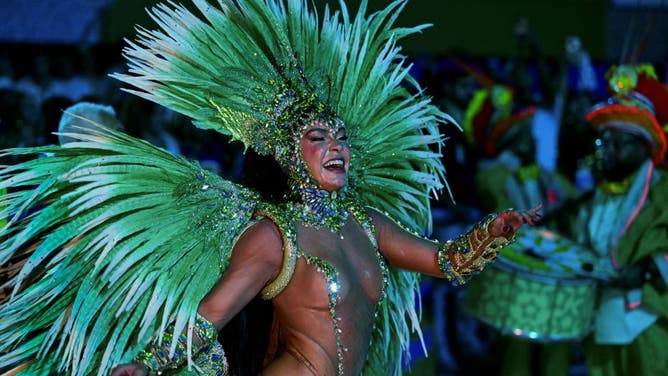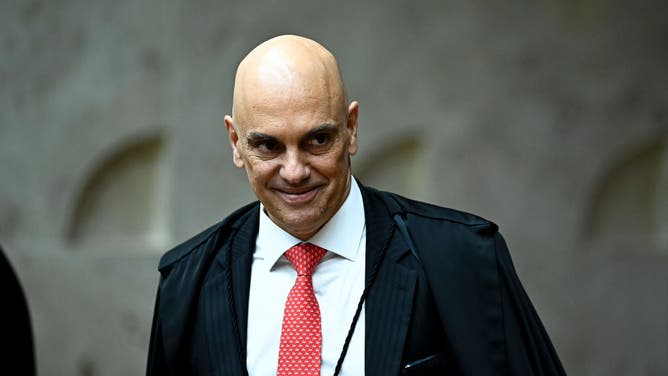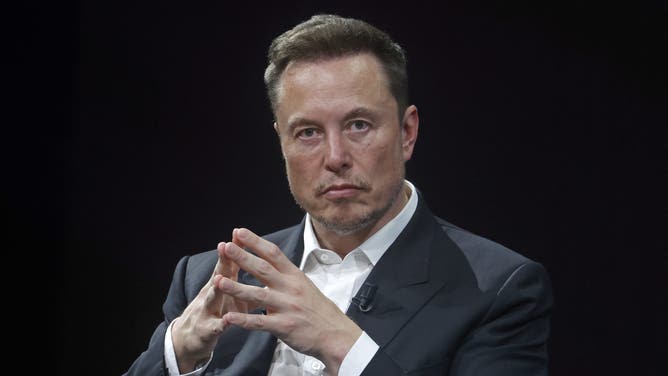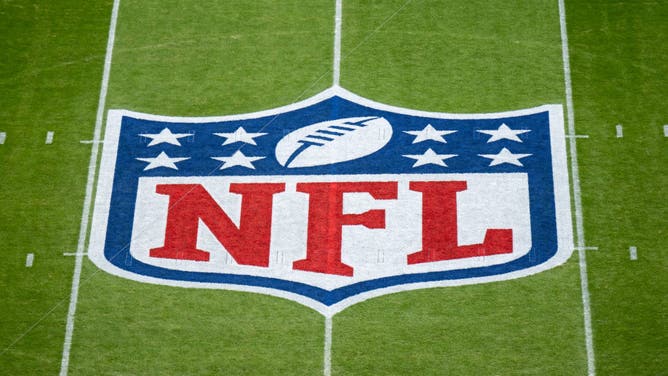NFL Talks Up Game In São Paulo, Remains Silent About Brazil's Censorship Against X | Armando Salguero
The last time the NFL talked about Brazil was last week to laud its new partnership with the South American country that will be on display Friday when the Philadelphia Eagles and the Green Bay Packers play a regular-season game in São Paulo.
"You all know the major focus we have on growing the game globally for the league and the 32 clubs and expanding our presence in more key markets," NFL executive vice president Peter O'Reilly said.
"…Brazil's a very important market in helping to realize that global growth. We've seen over the recent years the very engaged and very passionate fan base."

Members of Mocidade Independente de Padre Miguel samba school perform during the last night of the Carnival parade at the Marques de Sapucai Sambadrome in Rio de Janeiro, Brazil, on February 12, 2024. (Photo by Pablo PORCIUNCULA / AFP) (Photo by PABLO PORCIUNCULA/AFP via Getty Images)
NFL Excited About Brazil
So, the NFL is excited about Brazil.
You know what the NFL isn't too excited about? Saying anything about Brazil's recent ban of X (formerly Twitter) throughout the entire nation.
It's not too eager, as an American business, to call out Brazil for basically shuttering another American business because that business wouldn't do the Brazilian government's bidding.
The NFL, which has on multiple occasions made social justice and civil engagement one of its priorities, has said nothing about one of its partners banning the freedom of expression of approximately 40 million Brazilian citizens.
One day after the NFL talked about Brazil at length, Brazilian Supreme Court Justice Alexandre de Moraes on Friday ordered X shut down countrywide. The shutdown took effect on Saturday.

On August 29, 2024, in Brazil, the Minister of the Supreme Court, STF Minister Alexandre de Moraes, orders the blocking of the accounts of another company, Starlink, of Elon Musk, to guarantee the payment of fines imposed by the STF due to the lack of representatives of X in Brazil. (Photo by Ton Molina/NurPhoto via Getty Images)
Brazilian Justice De Moraes Bans X
De Moraes has had an ongoing feud with X's owner Elon Musk that began in April, when the judge ordered the suspension of approximately 300 accounts for allegedly spreading "disinformation."
De Moraes has been conducting an ongoing investigation against "agitators" and added Musk to his "digital militias" investigation when Musk refused to ban the accounts de Moraes doesn't like.
The "disinformation" that got de Moraes riled coincidentally came from mostly right-wing or opposition party politicians, and media accounts reporting unfavorably on Brazil's current left-wing government.
Among the hundreds of accounts de Moraes wanted Musk to ban for being unfriendly included that of Jair Messias Bolsonaro, the 38th president and last right-wing president of the country.

Photo illustration of the logo of the social media platform X (former Twitter) in Rio de Janeiro, Brazil on August 30, 2024. A Brazilian Supreme Court judge on Friday ordered the suspension of Elon Musk's X social media network in the country, after a months-long standoff over disinformation in South America's largest nation. (Photo by MAURO PIMENTEL / AFP) (Photo by MAURO PIMENTEL/AFP via Getty Images)
De Moraes Targets X And Others
In his ruling, de Moraes gave companies, including Apple and Google, a five-day deadline to remove X from its app stores and block its use on iOS and Android devices.
He added that individuals or businesses – including the NFL when it is in-country – that are found to still be accessing X by using VPNs could be fined the equivalent of $8,910.
The Brazilian Supreme Court voted Monday to agree with the de Moraes ruling.
All of this, mind you, to protect democracy.

PARIS, FRANCE - JUNE 16: Chief Executive Officer of SpaceX and Tesla and owner of Twitter, Elon Musk attends the Viva Technology conference dedicated to innovation and startups at the Porte de Versailles exhibition centre on June 16, 2023 in Paris, France. Elon Musk is visiting Paris for the VivaTech show where he gives a conference in front of 4,000 technology enthusiasts. He also took the opportunity to meet Bernard Arnaud, CEO of LVMH and the French President. Emmanuel Macron, who has already met Elon Musk twice in recent months, hopes to convince him to set up a Tesla battery factory in France, his pioneer company in electric cars. (Photo by Chesnot/Getty Images)
Musk: Brazil Move Is ‘Censorship’
Musk closed the X office in Brazil last month, saying the company's representative had been threatened with arrest if she did not comply with orders he described as "censorship", which he said is illegal under Brazilian law.
The U.S. House Judiciary Committee has been conducting a review on the matter since April and has already released a partial report titled "Brazilian Government Forced Censorship on X."
So what does the NFL think about this social justice cause as its teams pack for São Paulo which, coincidentally, is where de Moraes graduated from law school and currently teaches law at the University of São Paulo?
OutKick emailed an NFL spokesman requesting a statement on the matter and has received no reply as of this writing.

MUNICH, GERMANY - NOVEMBER 13: The NFL logo is painted on the field prior to the NFL match between Seattle Seahawks and Tampa Bay Buccaneers at Allianz Arena on November 13, 2022 in Munich, Germany. (Photo by Sebastian Widmann/Getty Images)
NFL Speaks Up When It Wants
The NFL typically replies on matters it is interested in addressing and ignores matters it doesn't wish to address, rather than saying "no comment."
This is not a good look for the NFL. It admittedly has no obligation to comment on the censoring of millions of people in a foreign country, whether it is playing games in that country or not.
But the NFL has made social justice and civic engagement part of its core values in recent years. The league long ago ignored calls to shut up play in favor of speaking out.
In the very meeting in which the league spoke about its looming Brazil game, league officials spoke of their "civic engagement" in encouraging voter registration in advance of the American election in November.
All NFL clubs have offered their stadiums and training facilities to be used as polling places or drop box locations, the league pointed out.
The NFL also proudly partners with gay rights causes, is committed to donating over $250 million over 10 years to BLM, and has been unafraid to speak against people and even municipalities it disagrees with about social issues.
NFL Is Not Moving This Game
You'll recall when Chiefs kicker Harrison Butker said women should be proud to be mothers and wives and spoke out against pride month and abortion, the NFL released a statement saying the player's views "are not those of the NFL as an organization."
The league in the 1990s moved a Super Bowl out of Arizona after voters there failed to make Martin Luther King Jr. Day a paid holiday.
The league is most definitely not moving its first game in South America out of Brazil merely because the supreme court there has quashed something so peripheral to football as freedom of expression on one of the world's social media giants.
Some folks, including OutKick founder Clay Travis, have suggested the NFL should consider the move – perhaps to Philadelphia or Green Bay.
It's not happening.
But a statement? Planting the seed of good old American free speech on soil that seemingly needs it?

09 August 2020, Brazil, Rio de Janeiro: Aerial view of the statue "Cristo Redentor" (Christ the Redeemer). The tourist magnet has been closed to visitors since the end of March, the beginning of the pandemic in the city. Brazil has reached the mark of 100,000 deaths proven to be infected with the coronavirus. Photo: Fernando Souza/dpa (Photo by Fernando Souza/picture alliance via Getty Images)
When Silence Looks Like Complicity
This one shouldn't be that difficult. Or controversial.
The league is so far staying out of it. But it can get uncomfortable for the NFL if it begins to look complicit with censorship by saying nothing.
The NBA stepped on that landmine years ago when it recoiled at the suggestion it disagree with China over that country's human rights abuses. China is a huge market and partner for the NBA.
O’Reilly said there are 36 million NFL fans in Brazil, which is the third-largest fan base in the world behind only the United States and Mexico.
But unlike in the United States and Mexico, none of them can express themselves on X.